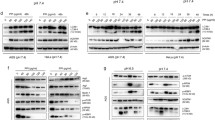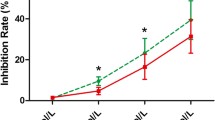Abstract
Gastric H+/K+-ATPase or vacuolar-ATPases (V-ATPases) are critical for the cancer cells survival and growth in the ischemic microenvironment by extruding protons from the cell. The drugs which inhibit V-ATPases are known as proton pump inhibitors (PPIs). In the present study, we aimed to evaluate the anticancer efficacy of pantoprazole (PPZ) and its consequences on NF-κB signaling in glioma cells. We have used MTT and clonogenic assay to show PPZ effect on glioma cell growth. Propidium iodide and rhodamine 123 staining were performed to demonstrate cell cycle arrest and mitochondrial depolarization. TUNEL staining was used to evidence apoptosis after PPZ treatment. Immunoblotting and immunofluorescence microscopy were performed to depict protein levels and localization, respectively. Luciferase assay was performed to confirm NF-κB suppression by PPZ. Our results revealed PPZ treatment inhibits cell viability or growth and induced cell death in a dose- and time-dependent manner. PPZ exposure arrested G0/G1 cyclic phase and increased TUNEL positivity, caspase-3 and PARP cleavage with altered pro and anti-apoptotic proteins. PPZ also induced ROS levels and depolarized mitochondria (Δψm) with increased cytosolic cytochrome c level. Further, PPZ suppressed TNF-α stimulated NF-κB signaling by repressing p65 nuclear translocation. NF-κB luciferase reporter assays revealed significant inhibition of NF-κB gene upon PPZ treatment. PPZ exposure also reduced the expression of NF-κB-associated genes, such as cyclin-D1, iNOS, and COX-2, which indicate NF-κB inhibition. Altogether, the present study disclosed that PPZ exerts mitochondrial apoptosis and attenuates NF-κB signaling suggesting PPZ can be an effective and safe anticancer drug for glioma.






Similar content being viewed by others
References
Basseres DS, Baldwin AS (2006) Nuclear factor-kappaB and inhibitor of kappaB kinase pathways in oncogenic initiation and progression. Oncogene 25(51):6817–6830. https://doi.org/10.1038/sj.onc.1209942
Breedveld P, Pluim D, Cipriani G, Wielinga P, van Tellingen O, Schinkel AH, Schellens JH (2005) The effect of Bcrp1 (Abcg2) on the in vivo pharmacokinetics and brain penetration of imatinib mesylate (Gleevec): implications for the use of breast cancer resistance protein and P-glycoprotein inhibitors to enable the brain penetration of imatinib in patients. Cancer Res 65(7):2577–2582. https://doi.org/10.1158/0008-5472.CAN-04-2416
Chen M, Huang SL, Zhang XQ, Zhang B, Zhu H, Yang VW, Zou XP (2012) Reversal effects of pantoprazole on multidrug resistance in human gastric adenocarcinoma cells by down-regulating the V-ATPases/mTOR/HIF-1alpha/P-gp and MRP1 signaling pathway in vitro and in vivo. J Cell Biochem 113(7):2474–2487. https://doi.org/10.1002/jcb.24122
Darzynkiewicz Z, Traganos F, Staiano-Coico L, Kapuscinski J, Melamed MR (1982) Interaction of rhodamine 123 with living cells studied by flow cytometry. Cancer Res 42(3):799–806
De Milito A, Iessi E, Logozzi M, Lozupone F, Spada M, Marino ML, Federici C, Perdicchio M, Matarrese P, Lugini L, Nilsson A, Fais S (2007) Proton pump inhibitors induce apoptosis of human B-cell tumors through a caspase-independent mechanism involving reactive oxygen species. Cancer Res 67(11):5408–5417. https://doi.org/10.1158/0008-5472.CAN-06-4095
Du L, Lyle CS, Obey TB, Gaarde WA, Muir JA, Bennett BL, Chambers TC (2004) Inhibition of cell proliferation and cell cycle progression by specific inhibition of basal JNK activity: evidence that mitotic Bcl-2 phosphorylation is JNK-independent. J Biol Chem 279(12):11957–11966. https://doi.org/10.1074/jbc.M304935200
Fais S, De Milito A, You H, Qin W (2007) Targeting vacuolar H+-ATPases as a new strategy against cancer. Cancer Res 67(22):10627–10630. https://doi.org/10.1158/0008-5472.CAN-07-1805
Finbow ME, Harrison MA (1997) The vacuolar H+-ATPase: a universal proton pump of eukaryotes. Biochem J 324(Pt 3):697–712
Ghosh S, May MJ, Kopp EB (1998) NF-kappa B and Rel proteins: evolutionarily conserved mediators of immune responses. Annu Rev Immunol 16:225–260. https://doi.org/10.1146/annurev.immunol.16.1.225
Haar CP, Hebbar P, Wallace GC, Das A, Vandergrift WA 3rd, Smith JA, Giglio P, Patel SJ, Ray SK, Banik NL (2012) Drug resistance in glioblastoma: a mini review. Neurochem Res 37(6):1192–1200. https://doi.org/10.1007/s11064-011-0701-1
Helmlinger G, Yuan F, Dellian M, Jain RK (1997) Interstitial pH and pO2 gradients in solid tumors in vivo: high-resolution measurements reveal a lack of correlation. Nat Med 3(2):177–182
Izumi H, Torigoe T, Ishiguchi H, Uramoto H, Yoshida Y, Tanabe M, Ise T, Murakami T, Yoshida T, Nomoto M, Kohno K (2003) Cellular pH regulators: potentially promising molecular targets for cancer chemotherapy. Cancer Treat Rev 29(6):541–549
Ji BC, Yu CC, Yang ST, Hsia TC, Yang JS, Lai KC, Ko YC, Lin JJ, Lai TY, Chung JG (2012) Induction of DNA damage by deguelin is mediated through reducing DNA repair genes in human non-small cell lung cancer NCI-H460 cells. Oncol Rep 27(4):959–964. https://doi.org/10.3892/or.2012.1622
Kowaltowski AJ, Vercesi AE (1999) Mitochondrial damage induced by conditions of oxidative stress. Free Radic Biol Med 26(3–4):463–471
Larsson H, Mattson H, Sundell G, Carlsson E (1985) Animal pharmacodynamics of omeprazole. A survey of its pharmacological properties in vivo. Scand J Gastroenterol Suppl 108:23–35
Louis DN (2006) Molecular pathology of malignant gliomas. Annu Rev Pathol 1:97–117. https://doi.org/10.1146/annurev.pathol.1.110304.100043
Luciani F, Spada M, De Milito A, Molinari A, Rivoltini L, Montinaro A, Marra M, Lugini L, Logozzi M, Lozupone F, Federici C, Iessi E, Parmiani G, Arancia G, Belardelli F, Fais S (2004) Effect of proton pump inhibitor pretreatment on resistance of solid tumors to cytotoxic drugs. J Natl Cancer Inst 96(22):1702–1713. https://doi.org/10.1093/jnci/djh305
Luo JL, Kamata H, Karin M (2005) IKK/NF-kappaB signaling: balancing life and death—a new approach to cancer therapy. J Clin Invest 115(10):2625–2632. https://doi.org/10.1172/JCI26322
Marquardt D, Center MS (1991) Involvement of vacuolar H(+)-adenosine triphosphatase activity in multidrug resistance in HL60 cells. J Natl Cancer Inst 83(15):1098–1102
Martin de Argila C (2005) Safety of potent gastric acid inhibition. Drugs 65 Suppl 1:97–104
Mathews S, Reid A, Tian C, Cai Q (2010) An update on the use of pantoprazole as a treatment for gastroesophageal reflux disease. Clin Exp Gastroenterol 3:11–16
Myung J, Cho BK, Kim YS, Park SH (2010) Snail and Cox-2 expressions are associated with WHO tumor grade and survival rate of patients with gliomas. Neuropathology 30(3):224–231. https://doi.org/10.1111/j.1440-1789.2009.01072.x
Neuwelt EA, Bauer B, Fahlke C, Fricker G, Iadecola C, Janigro D, Leybaert L, Molnar Z, O’Donnell ME, Povlishock JT, Saunders NR, Sharp F, Stanimirovic D, Watts RJ, Drewes LR (2011) Engaging neuroscience to advance translational research in brain barrier biology. Nat Rev Neurosci 12(3):169–182. https://doi.org/10.1038/nrn2995
Nishi T, Forgac M (2002) The vacuolar (H+)-ATPases–nature’s most versatile proton pumps. Nat Rev Mol Cell Biol 3(2):94–103. https://doi.org/10.1038/nrm729
Ohgaki H, Kleihues P (2009) Genetic alterations and signaling pathways in the evolution of gliomas. Cancer Sci 100(12):2235–2241. https://doi.org/10.1111/j.1349-7006.2009.01308.x
Ostermann S, Csajka C, Buclin T, Leyvraz S, Lejeune F, Decosterd LA, Stupp R (2004) Plasma and cerebrospinal fluid population pharmacokinetics of temozolomide in malignant glioma patients. Clin Cancer Res 10(11):3728–3736. https://doi.org/10.1158/1078-0432.CCR-03-0807
Ostrom QT, Gittleman H, Fulop J, Liu M, Blanda R, Kromer C, Wolinsky Y, Kruchko C, Barnholtz-Sloan JS (2015) CBTRUS statistical report: primary brain and central nervous system tumors diagnosed in the United States in 2008–2012. Neuro Oncol 17(Suppl 4):iv1–iv62. https://doi.org/10.1093/neuonc/nov189
Peppicelli S, Bianchini F, Contena C, Tombaccini D, Calorini L (2013) Acidic pH via NF-kappaB favours VEGF-C expression in human melanoma cells. Clin Exp Metastasis 30(8):957–967. https://doi.org/10.1007/s10585-013-9595-4
Portnow J, Badie B, Chen M, Liu A, Blanchard S, Synold TW (2009) The neuropharmacokinetics of temozolomide in patients with resectable brain tumors: potential implications for the current approach to chemoradiation. Clin Cancer Res 15(22):7092–7098. https://doi.org/10.1158/1078-0432.CCR-09-1349
Qiao S, Li W, Tsubouchi R, Murakami K, Yoshino M (2004) Role of vanilloid receptors in the capsaicin-mediated induction of iNOS in PC12 cells. Neurochem Res 29(4):687–693
Raghunand N, Martinez-Zaguilan R, Wright SH, Gillies RJ (1999) pH and drug resistance. II. Turnover of acidic vesicles and resistance to weakly basic chemotherapeutic drugs. Biochem Pharmacol 57(9):1047–1058
Raghunand N, Mahoney BP, Gillies RJ (2003) Tumor acidity, ion trapping and chemotherapeutics. II. pH-dependent partition coefficients predict importance of ion trapping on pharmacokinetics of weakly basic chemotherapeutic agents. Biochem Pharmacol 66(7):1219–1229
Sareddy GR, Geeviman K, Ramulu C, Babu PP (2012) The nonsteroidal anti-inflammatory drug celecoxib suppresses the growth and induces apoptosis of human glioblastoma cells via the NF-kappaB pathway. J Neurooncol 106(1):99–109. https://doi.org/10.1007/s11060-011-0662-x
Sigaroudi A, Stelzer C, Braun T, Frechen S, Huttner S, Schroter M, Kinzig M, Fuhr U, Holzgrabe U, Sorgel F (2016) Comparison of pantoprazole concentrations in simultaneous cerebrospinal fluid and serum samples. Pharmacology 98(1–2):70–72. https://doi.org/10.1159/000445720
Stubbs M, McSheehy PM, Griffiths JR (1999) Causes and consequences of acidic pH in tumors: a magnetic resonance study. Adv Enzyme Regul 39:13–30
Tanigawa T, Watanabe T, Higuchi K, Machida H, Okazaki H, Yamagami H, Watanabe K, Tominaga K, Fujiwara Y, Oshitani N, Arakawa T (2009) Lansoprazole, a proton pump inhibitor, suppresses production of tumor necrosis factor-alpha and interleukin-1beta induced by lipopolysaccharide and helicobacter pylori bacterial components in human monocytic cells via inhibition of activation of nuclear factor-kappaB and extracellular signal-regulated kinase. J Clin Biochem Nutr 45(1):86–92. https://doi.org/10.3164/jcbn.08-267
Udelnow A, Kreyes A, Ellinger S, Landfester K, Walther P, Klapperstueck T, Wohlrab J, Henne-Bruns D, Knippschild U, Wurl P (2011) Omeprazole inhibits proliferation and modulates autophagy in pancreatic cancer cells. PLoS ONE 6(5):e20143. https://doi.org/10.1371/journal.pone.0020143
Wang WJ, Sun AN, Guo F (2010) Noncanonical NF-kappaB pathway and hematological malignancies. Zhongguo Shi Yan Xue Ye Xue Za Zhi 18(4):1069–1073
Yeo M, Kim DK, Han SU, Lee JE, Kim YB, Cho YK, Kim JH, Cho SW, Hahm KB (2006) Novel action of gastric proton pump inhibitor on suppression of Helicobacter pylori induced angiogenesis. Gut 55(1):26–33. https://doi.org/10.1136/gut.2005.067454
Acknowledgements
We acknowledge Ms. Nalini M. (Microscopic facility, University of Hyderabad) for the technical assistance of confocal microscopy.
Funding
We acknowledge University with potential for excellence (UPE) India (UH/UGC/UPE-2 Interface studies/Research Projects/B1.4) and Department of Science and technology (DST-India) (SB/EMEQ-257/2013) for lab funding. KG acknowledges financial support from Council of Scientific and Industrial Research (CSIR), India (Award No. F.No:09/414(0863)/2009-EMR-I). DB is thankful to the Department of Biotechnology (DBT), India (Award No. DBT/JRF/13/AL/132/2043) for student fellowship.
Author information
Authors and Affiliations
Contributions
KV, DB, and PPB are responsible for the conceptualization and design of the studies. KV and DB performed all experiments and analyzed the data. KV and DB wrote the manuscript. KV, DB, and PPB reviewed and finalized the final draft.
Corresponding author
Ethics declarations
Conflict of interest
The authors declare no conflicts of interest.
Rights and permissions
About this article
Cite this article
Geeviman, K., Babu, D. & Prakash Babu, P. Pantoprazole Induces Mitochondrial Apoptosis and Attenuates NF-κB Signaling in Glioma Cells. Cell Mol Neurobiol 38, 1491–1504 (2018). https://doi.org/10.1007/s10571-018-0623-4
Received:
Accepted:
Published:
Issue Date:
DOI: https://doi.org/10.1007/s10571-018-0623-4




